Paul Mayhew-Archer on sitcoms, stand-up and tackling Parkinson's with jokes interview

Paul Mayhew-Archer is a name you may not know, but you will almost certainly know his work. Co-writer of The Vicar Of Dibley and My Hero, script editor of comedies including Mrs Browns Boys and Miranda, he also created his own shows including An Actor's Life For Me and Nelson's Column. We chat to Paul about screenwriting, sitcoms and the importance of laughter.
Your documentary Parkinson's: The Funny Side is a remarkable piece of work. It gave people permission to laugh at a serious subject, was that what you set out to do?
Yes, it absolutely was what we set out to do. I'm increasingly convinced that we have to give people permission to laugh and we have to take serious illnesses less seriously. I don't mean trivialise it, or be insensitive, but what I mean is that actually when you're living with an illness you need to laugh, and the people looking after you need to laugh, because it just makes it more liveable with. If you say 'Oh there's nothing funny about that, you shouldn't laugh, it's no laughing matter', that immediately kills any possibility of laughter. I know it's not good for you - I talked about this in my show that I toured around, I spent my teenage years in a house where we didn't laugh because my mother had cancer for several years.
I spent my teenage years writing bits of plays, trying to write in the style of Alan Ayckbourn, who was my big hero. Eventually I wrote a play in the sixth form and I was encouraged by my teacher to put it on. To hear an audience laugh was just a fantastic experience for me, the most exciting thing in the world. At the time, and for many years, I remember thinking 'Oh, I'm writing comedy to make people laugh', in that sense of when you're at school you try and make your friends laugh.
It's more with the Parkinson's that I've realised what I was actually doing in those teenage years was trying to make myself laugh in a house where laughter was in quite short supply. And that is why now, with the Parkinson's, I am determined to see the funny side and continue to see the funny side...
A; it helps me, it makes me feel better and B; when I do jokes, particularly for audiences with Parkinson's, they seem to like it as well and it doesn't matter how black the jokes are.
I remember talking to a professor some years ago. I said what a pity it was that Robin Williams had killed himself, because I thought he could have attracted a lot of publicity to Parkinson's. The Professor said "Yes, but the thing is, we don't think he had Parkinson's". I said "Really?", he said "No, we're pretty sure he had the lower body dementia which is associated sometimes with Parkinson's, but not Parkinson's itself". I said "Why do you think that?" and he said "Well because he killed himself. Very rare for people with Parkinson's to kill themselves". I said "I didn't know that, why's that?" and he said "Yes, although you do get very depressed with Parkinson's, but one of the other symptoms is apathy... so you might feel like killing yourself but you just can't be bothered". I remember thinking that was really funny and whenever I tell it to people with Parkinson's, they find it very funny as well! It's a very black joke about killing yourself! So that's why I try to see the funny side.
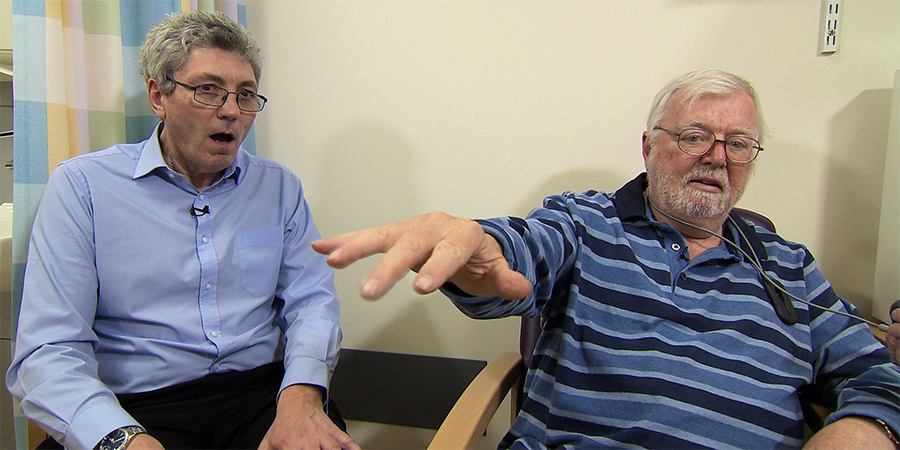
I've heard from lots of people who are newly diagnosed with Parkinson's and they found the programme reassuring, because what it's saying is that it is possible to laugh at it and it's not the end of the world. That's a very important thing to say, because I think a lot of people, when they are given such a diagnosis, they think it is the end of the world. Also, as an advocate for Parkinson's, to make people aware, there's a lot that isn't known about it by the public and it is much misunderstood. In order to do that, one of the ways to do it is through humour. If you make your point through humour, you make your point more attractively than just going 'Oh God, it's miserable!", because after a while people just switch off from that - "we're already living through Covid, I don't want to know about Parkinson's!".
If you can talk about the funny side of Parkinson's and the symptoms, it makes more sense. For example, I talk about some of the symptoms being loss of balance, the loss of the ability to walk sometimes, loss of the ability to smell and constipation. Of course actually, given the constipation, I regard the loss of my sense of smell as a positive. That sort of thing - I'm still saying Parkinson's is unpleasant, but in a way that makes it more acceptable and possibly stays with people, not the constipation you understand!
It's stuff we all laugh at.
Yes, it's very human stuff as well. Another one I do is 'We get stiffness in the arms and in the legs. Sometimes we freeze, which means we get moments where we're unable to move, or we get the shakes or we get erectile dysfunction. Personally, I think the erectile dysfunction is particularly unfair given that we get stiffness in both the arms and the legs!' Then I do some stuff about how Viagra is free on the National Health for people with Parkinson's, so it has its advantages!
One of the things about being diagnosed with something like Parkinson's is that people can sometimes forget that you are also a human being, you aren't defined by your illness, you have the same foibles and failures as well.
Yes, exactly right and also what's weird is that Parkinson's has given me enormous confidence in a strange sort of way. I would not have started performing as I have had if I didn't have Parkinson's. It gave me my subject. Not many people who work in comedy have Parkinson's, apart from Billy Connolly and he doesn't do much material about it, thank God! Otherwise there wouldn't be any point in me doing anything!
So I've got a subject that is 'my subject', that I know most other comedians won't be doing, so that gives me confidence. And also I've found that when I hear the laughter it's like one of my pills coursing through my body and I feel better, so it's a positive advantage for me, it's fantastic.
You were awarded an MBE in 2020, what was that experience like?
I haven't had it yet! I don't know what happens. Normally you go to Buckingham Palace or somewhere and they give you your MBE. In lockdown, I don't know, they may just bung it in a jiffy bag at some point. What was odd is that you're normally told a couple of weeks in advance, to make sure you would accept it, and then they announce it. But because of the lockdown we were told in May or June and then not allowed to mention it because they delayed the announcement. So I had to keep silent about it for four or five months which was a strange experience.
Around the same time, I did the Radio 4 appeal on behalf of Cure Parkinson's, which is one of the charities. I think it broke records for Radio 4 appeals, it did very well and raised over one hundred thousand pounds. It was very exciting, but my wife pointed out that because it was Easter Sunday I followed the Archbishop of Canterbury. Having the Archbishop of Canterbury as your warm-up is surreal!
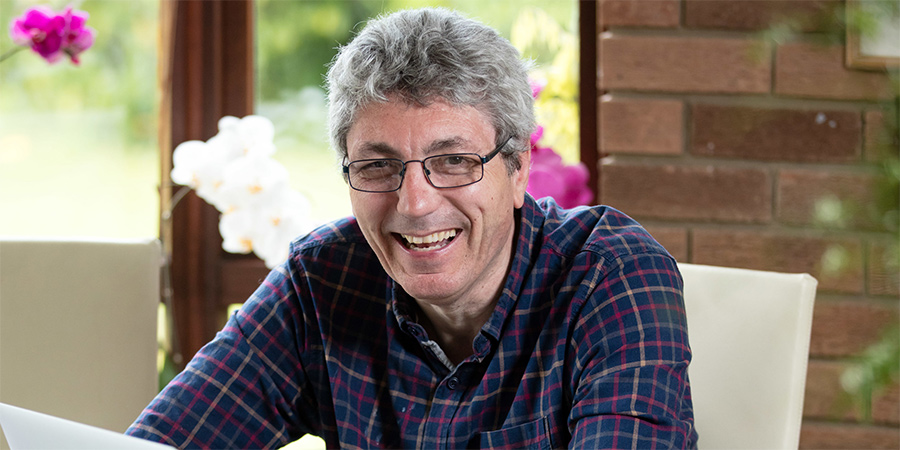
You've written a one-off drama, But When We Dance, what stage is that at?
It's at the stage where it's written, it's been written for some time. It keeps getting put back because of Covid and all of this. And because it will involve some people with Parkinson's who are vulnerable, we're got to be very careful. It's a romantic drama so it won't be following all the two metre distancing guidelines. So at the moment it's scheduled to be filmed next spring; it was going to be this spring. I can't really talk about casting, but anyway I was talking about it in the documentary.
That's why we wondered if it might already have been filmed.
No it's still there and it's still something I look forward to doing. My wife tries to stop me tinkering with it all the time. I hope it gets made soon, because one of the things I've noticed is that as the illness advances the piece gets more serious. So what started not as a light-hearted romp but a comedy drama, now has a bit more gravitas. If it's delayed more than five years I think it will turn into the most miserable, ghastly, depressing tragedy ever, so I hope we make it quite soon!
You mentioned turning to stand-up. Is it true that your first gig was at The Albert Hall?
It sort of was. I'd done warm-ups for radio shows, in that sense of just going out and asking the cast to come on, but I hadn't really done proper comedy, as it were. I'd given talks to WI groups and I used to be a teacher so I was used to standing up in front of class, or WI's. But my first actual gig coming out and doing some stand-up jokes was at the Royal Albert Hall at a Parkinson's UK fundraiser. So that was two or three minutes there and then I did ten minutes at The Comedy Store, that was my second gig.
My third gig I suppose was preparing to do Edinburgh, because having done ten minutes at The Comedy Store I thought 'Well, I can do an hour at the Edinburgh Fringe'. I loved that and I thought 'Well actually I could do a second half where I'm answering questions and telling stories', so I now have an entire evening. I love it, I would have been doing several shows this year.
My thought is now, what I'd really like to do is arrange with a Parkinson's group in an area that I'll come and do a show for nothing. They find a venue, sell tickets and keep the dosh, raise some money for them. I'm a resource! That's the plan.
Was it harder playing the cavernous Albert Hall or The Comedy Store?
Actually they were both fantastic, I absolutely loved it. Properly nervous beforehand, they are lovely venues. The Royal Albert Hall is a bit terrifying because it's so huge the wave of laughter takes a bit of time to arrive so that's an interesting experience. I remember I tripped up at The Comedy Store coming onstage.
Anything for a laugh!
That's right, and anything to draw attention to the Parkinson's. But they were both lovely. I'm trying to think whether there were any terrible venues. When you're touring round the country you never know quite what you're going to get, but on the whole they were nice.
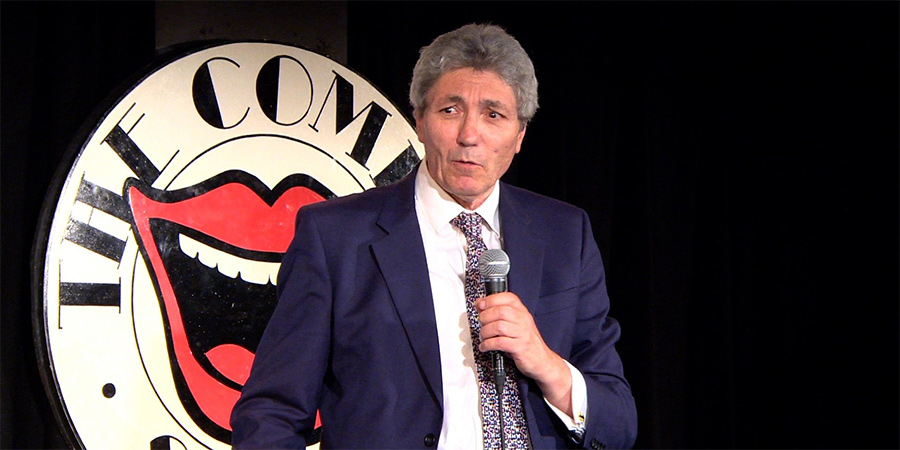
There was one disaster, what happened was I was booked to go to the White Rock Pavilion in Hastings, very near to where I grew up in Bexhill. So I knew the White Rock Pavilion; it's a vast, cavernous place. I was in the studio, which I didn't know at all. It seats about a hundred, we sold about 90 tickets so it wasn't one of the biggest audiences. When I arrived, I discovered that the show due to be on in the main theatre had been cancelled, so I'd been put in there! So a show for eighty people was performed in this vast theatre. They felt a bit lonely, and I certainly did! I do think that if you want to be in a big auditorium you need a commensurate audience.
Was it interesting going from writing, a fairly solitary profession, to live comedy where your jokes get instant feedback?
Yes, and also you're not delivering it, you're writing for other characters and other people and it's very difficult to know how it's going to play. One thing I've noticed is that the comedies that arrive on our screens the most fully formed are those that are written by their leading actor, on the whole.
It's obvious I suppose, but the actor is talking to the writer all the time. The writer knows what the actor can do and the actor knows what the writer can write to the actor's strengths. So there that symbiosis - literally - in the case of The Office and Absolutely Fabulous, Fawlty Towers and all of these shows, This Country, they're written by the people playing the parts so they know the characters inside out. So in a way, Series 1 is like Series 3 of other shows.
We were very lucky with Dawn French in Dibley because Richard Curtis spent a lot of time with her and she was very involved in looking at the character and examining the character, but a lot of the time you're doing a show and you cast your leading characters and basically you meet when you do the pilot, have a chat for three or four days and then do the series so you don't really get to know exactly what can be done until Series 2 or 3. With Dawn and the cast of Dibley it was an absolute joy.
You've said in the past that you prefer writing on other people's shows as opposed to creating your own.
I'm better at it. I suppose the truth is I knew how to write Alice. I'm not sure I ever could have created Alice. Alice was such a leap of the imagination. Most sitcoms have an idiot somewhere in there but you have to find a way of making it an idiot you've never seen before. There was something about Alice and the performance by Emma Chambers, it was about finding that idiot who was six years-old. There were the sexual elements too and her adoration for Hugo. But the thing is, I'm not sure I ever could have ever created Alice, but having read the first pilot script by Richard I got a sense of who she was and I knew how to write the character. And I think it's that, if I'm writing on other people's shows they may have created the characters and if I get the show, I know how to write it. Whereas with my own I'm probably not brave enough to take those kinds of risks with characters.
The joy with Dibley was that the characters were so clear on the page and Richard's ability to sum up a character in a line. When Dawn comes in, ten minutes into the first episode, and says "You were expecting a bloke. Beard, bible bad breath. Instead you got a babe with a bob cut and a magnificent bosom", that says everything about her. It not only describes her and the world she is coming into which is so different to the world they had, which was beards, bibles and bad breath, the very fact that she can say it with such confidence tells you so much about her. And she's saying it to the man who's going to be the opposition, the antagonist. It tells you everything about the show in a line, it's just incredible.
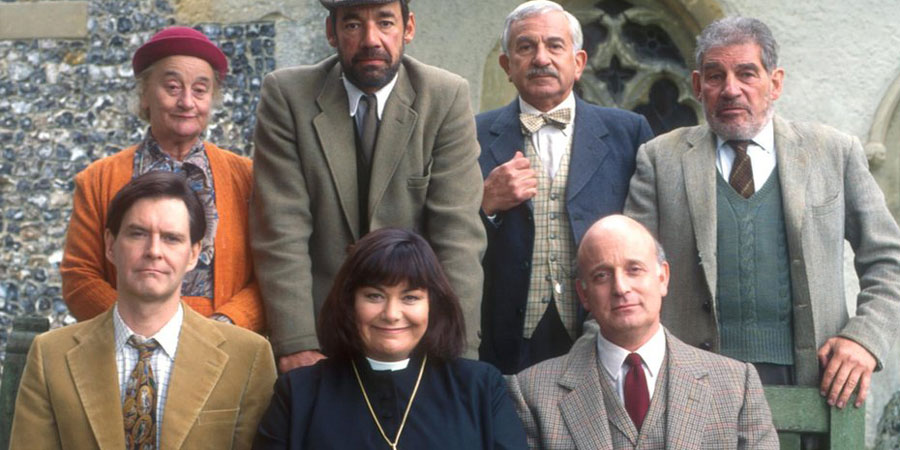
Dibley breaks the rules of sitcom in a way, because the central character is inherently nice and the oddballs populate the village around her.
That was one of the reasons we did it. It was to try and see - Richard was coming off Blackadder of course - if it was possible to centre a sitcom on a good character. It is, because a good character can have just as many fatal flaws as a nasty one. Her fatal flaw, well she has several - she goes doolally when a handsome man is around -
... Chocolate
Chocolate is off the scale, as indeed it is with me. Also, she can't say no, so when four people invite her to Christmas lunch, she has to have Christmas lunch. She will leap into things. The first episode I wrote was the Community Spirit one where she has to get someone to open the fete. The fact that she says "Oh God, I don't know who opened it last year, it was a total disaster, we didn't take very much", and it was of course David. She's, in the nicest possible way, ambitious for it to do well but she still has to find a guest.
There are also some scenes of real pathos in Dibley. One of the best examples is Frank's coming out scene, which combines the absurdity of the moment with quite heartrending emotion. Was it hard to coalesce the two?
Not really, I remember we had this idea of doing the week's broadcasts on Dibley Radio. Where I live in Abingdon they had done a week's broadcast. We had a scene in the episode with a phone-in where nobody phoned in. That was based on a programme me and my wife heard on Abingdon radio. So the presenter said "We're kicking off our show today with a phone-in, so do phone in with your memories of Abingdon during the war and while we're waiting for that first call here's Glenn Miller And His Orchestra with a wartime song" It came back and he said "Do ring in with your memories, here's another wartime song". They came back to the chap and he said "Do please ring in with your memories of Abingdon during the war. Actually it doesn't have to be during the war it could be memories of Abingdon anytime. It doesn't even need to be memories of Abingdon, just ring in with your memories", and I remember saying to Julie, my wife, "We ought to ring in. On the other hand it will be funnier if we don't!". He kept going for two hours without a single call.
So I'd got this idea. We take it in turns to write the first draft; I was writing the first draft of this one. I plotted it out and I remember Richard saying "It needs a bit more gravitas". It was around the time of Clause 28 and there was lots of discussion about homosexuality and suchlike and the MP Matthew Parris decided that this was the time to come out. He was finally called to speak in the debate so he stood up in Parliament and gave a very impassioned speech about being gay. At the end he sat down and looked around, and the chamber was almost empty because it was midnight and all the press had gone home. He had to pluck up the courage to come out and do it again later. That was the starting point. We thought "What if Frank came out but nobody listened, because of course they wouldn't listen to his show as it would be so boring".
John Bluthal did it beautifully and it was a lovely moment because we now know something that almost everyone else doesn't. I always like those sorts of situations. Richard said we had better check with John, because it's quite a radical rethink of the character! We told John and he said "Marvellous! My character makes so much more sense now!".
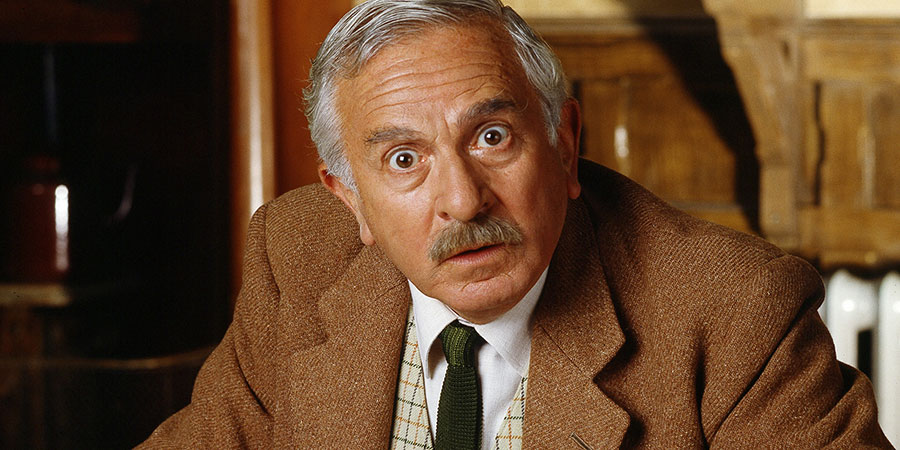
The interesting thing is that it seems to me there are two schools of sitcom writing. Ones where people have a bible, they know the backstory of every character. They would have known that Frank was gay. Then there's the other school of sitcom writing where you start with a situation in Episode 1 but actually you don't know the background of the characters, you discover things along the way.
One of the most remarkable ones I remember was at the end of the second series of One Foot In The Grave. It was the first episode where they were in real time in one place (Timeless Time). They're in the bedroom and Victor is moaning about all sorts of things. Eventually, Margaret starts reminiscing and we discover they had a baby who never came out of hospital. I remember thinking "Oh my goodness, no wonder he is so bitter about the world. The world is full of idiots and the one perfect human being died as a baby. It explains everything."
I was working with Susie Belbin, the producer, at the time and I said "That as so brilliant, when did David Renwick realise this? Did he always know it was going to happen?" and she said "No, I think he just thought of it as he was writing that episode". I suppose it's only human - we meet, we talk to one another and say things, we make certain conclusions about characters, we don't know why. Then suddenly, at some point, we discover something about them that explains why they are like they are. In that way we don't know about people, it's the same with characters, we haven't created all the stuff about them. It's an incredibly exciting adventure.
So you didn't write detailed character biographies for Dibley?
No, it was literally what I was sent by Richard, Episode 1. It was an interesting experience really because I was working at Channel 4 at the time. Tiger Television got in touch and said "Richard's writing a sitcom called The Village about a woman vicar and he's looking for someone to write with, can you go and have a chat?". I thought he wanted to pick my brain about writers. So I wrote a list of ten writers and went along. I'd met him a couple of times on things to do with Comic Relief and I said "Here's the list, they're all really nice and delightful, I'm sure you'll get along with them really well". He looked at the list a bit bewildered and said "Oh, I thought you might like to have a go". I was a bit astonished and it turned out he'd seen An Actor's Life For Me. So he asked. I was a bit in awe of Richard because he'd done Mr. Bean and Blackadder. I said "Shall I send you some storylines and if you like them I can write one?".
I sent him three or four storylines and one of them was the Community Spirit one where Elton John doesn't turn up. Then I wrote another one in the first series and then we wrote the rest together, that was the happiest experience. All my hopes for writing had been pinned on An Actor's Life For Me. When it was axed after the first series I was pretty devastated but it turned out to be a calling card. You don't need millions of viewers, you only need one of them to be Richard Curtis!
Did he ever say what it was he saw in An Actor's Life For Me that made him think you were a good fit for Dibley?
I don't know. If he did I've forgotten. I was so delighted and overwhelmed.
Sign the contract before he can back out!
Yes!
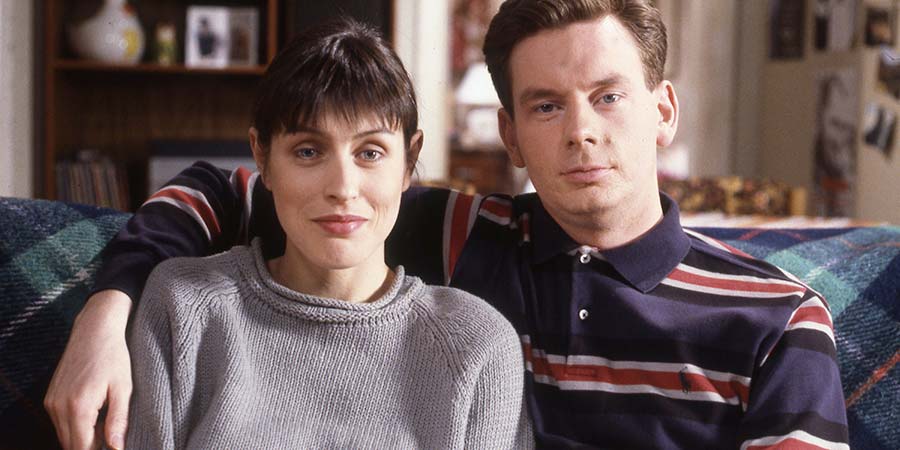
An Actor's Life For Me was your first sitcom, written for Radio 2. Did the idea come from people you'd met whilst working in radio?
One of the initial thoughts behind it was I'd worked with the actor Peter Egan and he was telling me a story about the time he was cast in something, his agent had said to him "If they ask if you can do something, just say you can do it". He'd gone along, I think it was as an action character, and they'd said "Can you swim?" "Yes" "Can you drive a truck?" "Yes". He said he could do them all, he couldn't do any of them. He was telling me how the catchphrase for the episode was "Call the stuntman!". It was a very funny story and I remember thinking "If you're a young actor and you are struggling, you will say all sorts of things and do all sorts of things to get the part, to get the experience." You will get your hopes up then dashed and then up and dashed again.
You need to have a couple of central relationships but you meet so many different people and there is every opportunity for a good range action and plot. I've always loved farcical plots so it seemed to me it offered a lot of opportunities like that. I had a go at writing the radio series and then it went to television and I remember getting incredibly excited. Then it went out on television and you then become obsessed with ratings. A nightmare! They held up but they didn't build which was a bit worrying.
Then, irony of ironies, about four weeks in I met a chap called Simon Brett, a radio producer who produced the pilot of The Hitchhiker's Guide To The Galaxy and then wrote a hit radio series called After Henry, which went to ITV, a huge hit with Prunella Scales and Joan Sanderson. So I happened to meet Simon and he said "Oh I'm really enjoying An Actor's Life For Me, very well done, I hope it gets recommissioned". I said "Thank you very much". Anyway, two weeks later all the episodes of An Actor's Life For Me had gone out on Thursday evenings opposite This Week. I do not know why, on the last week they didn't show This Week, instead they showed a repeat of After Henry. That got more viewers, my viewers dropped - it got axed by the man who said he hoped my series got recommissioned! Not by him really, but it was the killer. Such is the irony of life.
It's a real shame because it's such a good sitcom. The episode that is set backstage at a farce and then the episode turns into a farce is brilliant.
Thank you so much. I was really delighted with that episode, it was a joy to do. I think it was Caryn Mandabach, who was the head of Carsey-Werner which made Roseanne, who said that the purpose of a comedy plot is to chase your characters up a tree and then throw stones at them. Just to make things worse and worse and to build and build. The momentum build in that episode was really amazing and something I loved to do. Again I suppose I was influenced by Ayckbourn, his brilliant use of those sorts of conceits to generate ideas is remarkable.
Your next sitcom on television was Nelson's Column, which I haven't been able to see much of because it's not out on DVD.
No, well what happened was when Actor's Life was axed the head of comedy at the time was very upset and decided to commission me to write something else with John Gordon Sinclair, so we did Nelson's Column for two series and then he went off to the West End and it got more and more difficult to find time to do the third series, which there had been talks about.
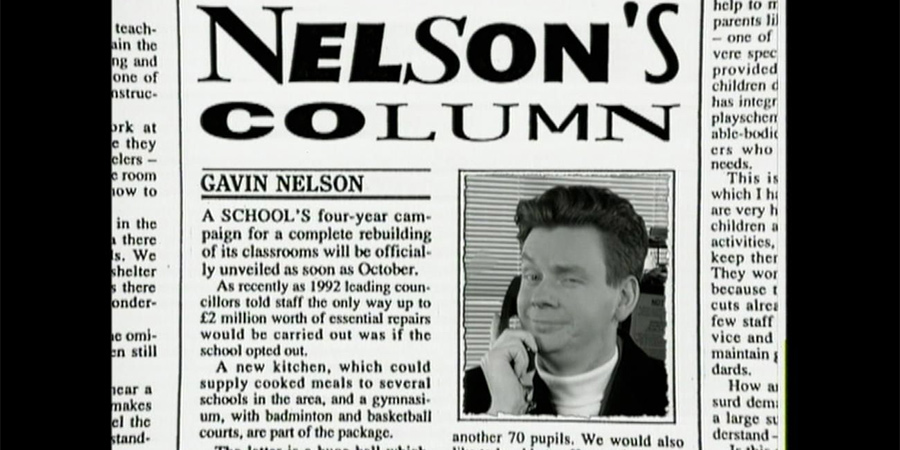
Then I was doing Dibley and My Hero, both of which were created by Richard Curtis and Paul Mendelson respectively. I really enjoyed working on those shows. I was looking at an episode of My Hero recently, the one where they're looking after the parents' dog and he's translating, Pet Rescue. It was genuinely funny.
It was one of my favourites growing up, it's where I would have seen your work for the first time.
Yes it was a very likeable family sitcom, it's shown a lot on Gold.
It came out at the wrong time in a way, we now live in a world saturated with superheroes.
It was ahead of its time wasn't it? The trouble is we are now so saturated with superhero shows I'm not sure I'd like to see another one.
Also you did it on about a tenth of the budget.
Yes that's true. Was it a tenth of the budget?
A hundredth of the budget!
Yes, the meal budget of those shows! Also I was reminded what a funny actress Geraldine McNulty is.
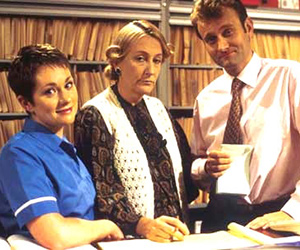
Mrs Raven is one of the all-time great sitcom characters.
Yes, because she's so morose and miserable. What I remember about the dog episode is that it was such a simple idea - she gets sacked at the beginning of the episode and spends the rest of it as his patient. If you're a doctor getting stalked by his patient and she was like Mrs Raven, it would be a nightmare! By the end he is begging her to come back. It's those simple ideas that are the most delightful and when they come to you, you think 'Oh yes, thank you!". I don't know where they come from, it's a strange thing really.
I find that if I focus long and hard, I don't get them by wandering round, if I sit and focus on the characters and then start writing something it's like a little bird will come and hover on your shoulder and whisper in your ear, but only if you've been sitting there long enough, it's a mysterious process.
Your third sitcom, Office Gossip, came out at the same time as another successful show set in an office. Was that serendipitous or just bad luck?
The thing was, The Office is one of the great masterpieces! I thought "Oh dear, a hiding to nothing here". My only real memory was, again, to do with ratings because I think around week three or four it was not doing well, not disastrous, but not doing well. I remember waking up at three or four o'clock in the morning and in my half-woken state thinking "What can I do to boost the ratings? I know, I'll tell the newspapers that unless more people watch the programme I will go into Oxford and set fire to myself. Yes, that's what I'm going to do". I woke up in the morning remembering thinking that and thought, "am I insane?! No more people would watch the show, in fact more people would go into Oxford to watch me!"
People might turn off deliberately!
Yes!
Steven Moffat was the script editor, so there was quite a pedigree behind the show.
We just had a few chats really. Interestingly, Steven used to come to the Dibley recordings because his wife, Sue Vertue, produced Dibley. He was saying "I wish I could write something successful", because around that time he'd done Chalk.
Chalk is one of the all-time great 'could have been a hit' sitcoms.
Well the thing is, I read the scripts of Chalk and they were quite possibly the funniest scripts I've ever read. As a set of scripts, you talked about the farcical episode, up the ante ten times, they were so breathtakingly good. I would read them on the coach going into London or coming home and I would be helpless with laughter. And then something happened in the making of the show, in fact I think Steven has said that he met Steve Coogan, who said "I've been watching that show, it's brilliantly written. I'm not sure it works on the telly but I love the character of Slatt so much I learnt bits and would do them in my living room" and Steven said "So I had the perfect actor... doing it in his living room".

It just went wrong. So he was jealous, wanting to write something with the success of Dibley and then of course he goes and writes Sherlock! He also wrote what I think it probably the finest episode of Doctor Who of all time, Blink. Unparalleled. Extraordinary writer.
You have read thousands of scripts in your career. What are some of the most common mistakes you find, particularly in pilot scripts?
I think the important thing is, you've got to care about the characters, however unpleasant they may be, you've got to care about them. They've got to have a range of emotions that they go through but you believe all of them so that the characters are consistent with themselves.
One of the tricks you can pull off is you can put them in the middle of a hierarchy. In Series 1 of Blackadder I wasn't really sure who Blackadder was. But from the second series on, Rowan Atkinson was able to play all the different notes of the character. He could be a bully and he could be a wheedling subservient desperate to please. He could play all of those different things and it was all consistent because he was in the middle of a hierarchy. When he was with the Queen, she was a woman who could have his head cut off. When he was with Percy and Baldrick he was Lord and Master and he could be a bully. So he could do all those things and they were entirely consistent within the world.
In The Office, Brent is appalling to the staff, but above him he has Patrick Baladi, the boss from heaven, the perfect boss who shows up his shortcomings and is a threat to him at every turn. And if you can find a way to do that then you can give your central characters a range of emotions and you care about them as a result. Another thing is that all sitcoms are about family. So Porridge, I think, is about a mother, father and two brothers. Fletcher is Godber's older brother who is trying to educate him so he doesn't make the same mistakes. They've got a martinet father who happens to be played by Fulton Mackay and Barraclough is their soft, easy-going mum. It's a family.
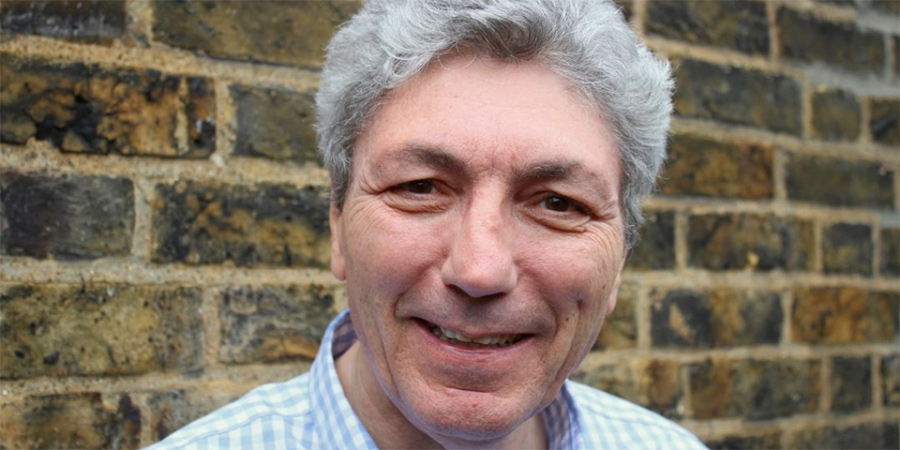
In the case of Dibley, I always thought it was The Sound Of Music without the songs. It starts with the Von Trapp family, which is all the villagers, and David Horton is their dad who is rather strict and doesn't let them run things. Suddenly, not a nun but a vicar turns up and shakes up the whole thing, allowing the villagers to be as mad as they want to be. Fortunately she doesn't marry David. But it is about a family. Because it's human and we relate to it on those terms, we care about the characters. The show that's got it absolutely right, and I don't think I biased as my son produced it, I do think This Country is just a work of genius. It's wonderful, the vicar. It's brutal, and funny. It's warm. So that's what people get wrong, they miss the bit that we can care about.
I worked on Mrs Brown's Boys, it's ridiculous, it's a man dressed as a woman! In fact there was a moment in the first episode when he did something that was quite astonishing I thought. Halfway through the first episode, she's upset her son because he's interfering in Dermot's wedding. Dermot stalks off and says "I don't know why you keep poking your nose in", she gazes after him and says "Because I'm your mammy". The audience went "Aaaaaaahhhhhhh", panto style. They'd never done it before because he'd never performed it before. He turned to the camera and said "It's a man in a fucking dress!". The roof came off the studio!. He then turned, looked after the retreating Dermot and the audience went "Aaaaaaahhhhhhh" again. I remember thinking "That is truly astonishing" because he has got the audience in this studio believing him on two completely different levels of reality. They know it's panto, they know it's a sitcom, a man dressed as a woman. He has suddenly broken the 4th wall, the 5th wall, the 6th... And they've gone with him breaking that wall and then somehow instantly he has rebuilt the wall with a double layer of bricks and they've gone back with it again and their happy with him. And that I think is the secret of the show.
What is your role when script editing Mrs Brown's Boys, it's Brendan O'Carroll's baby and all the cast are a family?
Literally! Well, my role is to work with Brendan because he'd got the plays and initially it started out adapting the plays. It was taking elements from the two hour plays and reorganising them so that they made a half hour episode. So you'd have to take different elements and shorten them into a beginning, middle and end.
Then, we used up the plays so it was generating thought and ideas. For example, I kept badgering him, saying "I know there's something to do with glue, a gag". Eventually, his eyes lit up and he said "Spray glue. Glue you can spray". And from that came this thing where he thinks he's spraying air freshener in the loo and between his legs. He glued his legs together. He ends up sitting on the cooker so that Winnie can separate his legs. The cooker is on so he has to sit in the sink and she's got her head stuck between his legs - "Please don't fart!". I remember that being so funny.
Then, I think we came off that scene and he said "Just wait, the grannies will be crying in two minutes time". There was some happiness, maybe one of the sons was coming back from the missions. We came off that sequence, applause, laughter, hysteria. And the next scene, within two minutes you could hear the sobs from the grannies in the audience. His ability to go from extreme, huge humour to genuine pathos...
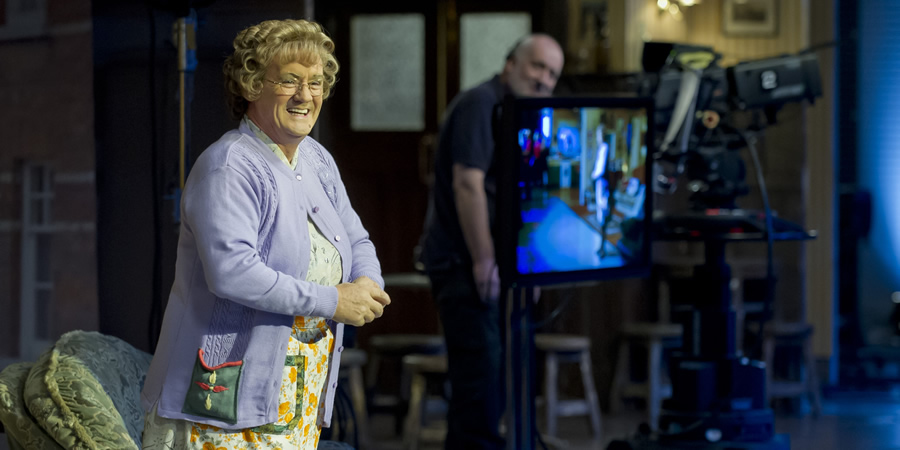
So that was my role. He knows it all now, I'm not needed there and I'm busy doing Parkinson's stuff. He's extraordinary, amazing.
The Christmas episode of The Vicar Of Dibley, The Christmas Lunch Incident, is a British institution. How does it feel knowing that words you wrote over twenty-five years ago are still being enjoyed and will continue to be enjoyed for many years to come?
It is extraordinary. I've written episodes of Dibley that went out on Christmas Day and I've written episodes of Mrs Brown's Boys that went out on Christmas Day. That's a profound honour, actually. I feel a bit like I imagine Eddie Braben must have felt. It's also a massive responsibility. If you started thinking seriously about the responsibility you'd seize up. People's Christmases depended on the jokes Eddie Braben wrote for Morecambe & Wise!
I can't imagine the pressure that must have been on him.
Though it did mean that he wrote probably the funniest comedy sketch of all time, Andre Previn.
It's all the right notes, but not necessarily in the right order!
The greatest line in British comedy. Throughout my teenage years and before, when I was I was writing my dream was either to have a play on in the West End or a sitcom on telly. I would watch Fawlty Towers and think "Gosh, I'd love to do something with that success, and so to have worked on Dibley and Mrs Brown and have shows go out on Christmas Day is gobsmacking and lovely, I can't quite get over it. Plus I have had the opportunity to work with not just brilliant people, but really nice people as well, People in comedy are, I find, very nice. Their instinct is to make people happy.
If a joke doesn't work, if a sitcom doesn't work and is a bit of a flop, the writer and performers will be majorly disappointed. I remember when An Actor's Life was axed it was like being made redundant. So it's tough, and you don't really need people putting the boot in. And yet all that's happened is that you've written something that isn't as funny as you hoped it would be. Sometimes people react as if you have basically kicked their dog to death. The fury that is sent out and all you've failed to do is make them laugh! But mostly people who work in comedy are people who genuinely want to make people happier, I think, and that's rather laudable and lovely.
Paul Mayhew-Archer supports cureparkinsons.org.uk
Help us publish more great content by becoming a BCG Supporter. You'll be backing our mission to champion, celebrate and promote British comedy in all its forms: past, present and future.
We understand times are tough, but if you believe in the power of laughter we'd be honoured to have you join us. Advertising doesn't cover our costs, so every single donation matters and is put to good use. Thank you.
Love comedy? Find out more

